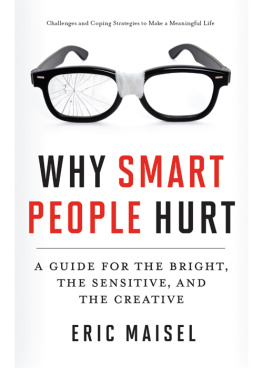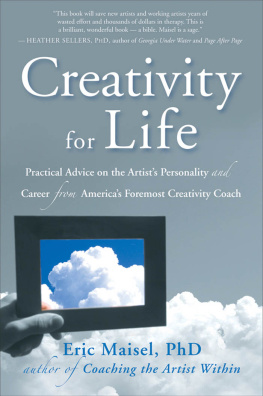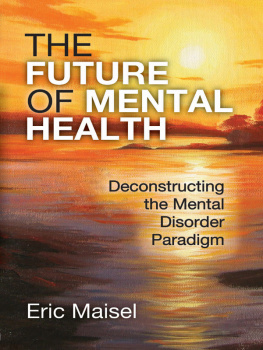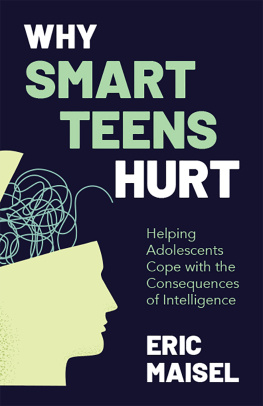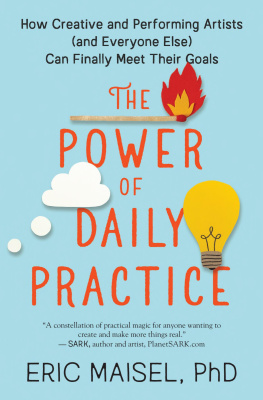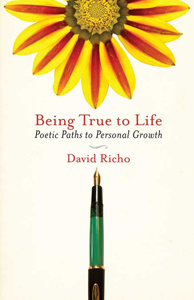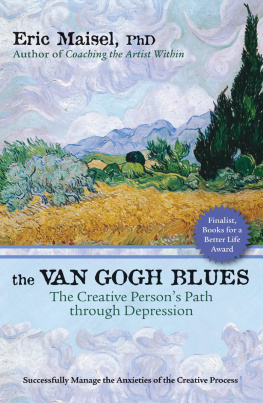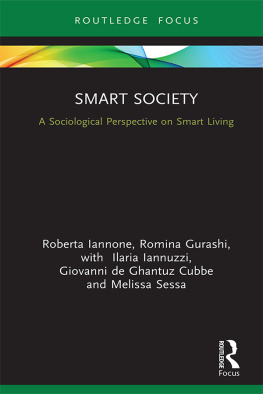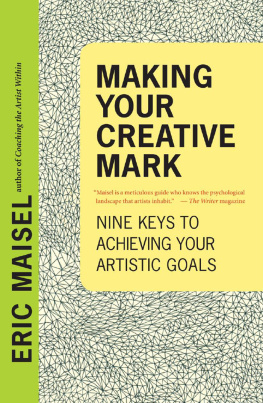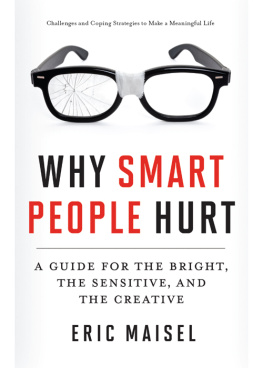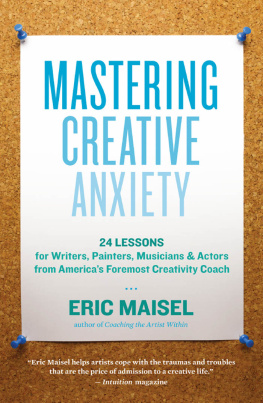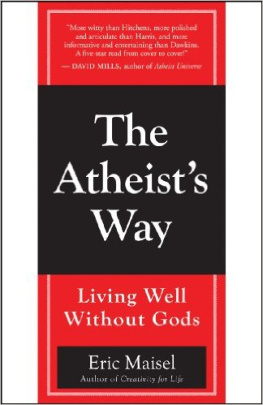PRAISE FOR WHY SMART PEOPLE HURT
Eric Maisel has devoted his life to sharing his deep understanding of creativity, meaning, and life purpose. In this new book, Maisel explores the suffering of smart people and once again offers innovative paradigms and practical solutions to end their pain.
Gail McMeekin, author of The 12 Secrets of Highly Creative Women and The 12 Secrets of Highly Successful Women
In this insightful examination of the challenges bright individuals face, Eric Maisel explores how to reclaim your passion and to live a richer and more productive life. It's a smart move to read this wise book.
John Moir, author of Return of the Condor: The Race to Save Our Largest Bird from Extinction
If you're so smart, why are you in so much pain? Dr. Maisel gets to the root of the special mental challenges of bright people, provides a new system for deriving meaning and joy from life, and helps you conquer the special challenges of being smart with compassionate and invaluable advice! This book will make a smart person even smarter.
Dr. Katharine Brooks, author of You Majored in What? Mapping Your Path from Chaos to Career
Eric Maisel's Why Smart People Hurt is original, provocative, and also reassuring. His conceptualization of mania as a thinking disorder and his treatment for this are original ideas that to my knowledge have never before been expressed. I have taken several courses from Eric and I know personally how powerful his methods are. His principles of natural psychology are, as he describes, simple and yet immensely practical and effective.
Dr. Laurie Jo Moore, MD, ABPN, FRANZCP
This is a wise, insightful, and compassionate guide for bright, sensitive, and creative people. If you're smart, you'll get it.
Michael J. Gelb, author of How to Think Like Leonardo Da Vinci: Seven Steps to Genius Every Day
OTHER BOOKS BY ERIC MAISEL
NONFICTION
Affirmations for Artists
The Art of the Book Proposal
The Atheist's Way
Become a Creativity Coach Now!
Brainstorm
Coaching the Artist Within
Creative Recovery
The Creativity Book
Creativity for Life
Deep Writing
Everyday You
Fearless Creating
A Life in the Arts
Living the Writer's Life
Making Your Creative Mark
Mastering Creative Anxiety
Natural Psychology
Performance Anxiety
The Power of Sleep Thinking
Rethinking Depression
Sleep Thinking
Ten Zen Seconds
Toxic Criticism
20 Communication Tips at Work
20 Communication Tips for Families
The Van Gogh Blues
What Would Your Character Do?
Write Mind
A Writer's Paris
A Writer's San Francisco
A Writer's Space
FICTION
Aster Lynn
The Blackbirds of Mulhouse
The Black Narc
Dismay
The Fastest Horse Available
The Fretful Dancer
The Kingston Papers
Love in Focus
Murder in Berlin
Murder on Capitol Hill
New Israel
JOURNALS
Artists Speak
Writers and Artists on Devotion
Writers and Artists on Love
MEDITATION DECKS
Everyday Calm
Everyday Creative
Everyday Smart

First published in 2013 by Conari Press, an imprint of
Red Wheel/Weiser, LLC
With offices at:
665 Third Street, Suite 400
San Francisco, CA 94107
www.redwheelweiser.com
Copyright 2013 by Eric Maisel
All rights reserved. No part of this publication may be reproduced or transmitted in any form or by any means, electronic or mechanical, including photocopying, recording, or by any information storage and retrieval system, without permission in writing from Red Wheel/Weiser, LLC. Reviewers may quote brief passages.
Library of Congress Cataloging-in-Publication Data
Maisel, Eric, 1947
Why smart people hurt : a guide for the bright, the sensitive, and the creative / Eric Maisel.
pages cm
ISBN 978-1-60925-885-6
1. Gifted persons--Psychology. 2. Intellect. I. Title.
BF412.M32 2013
153.9'8--dc23
2013017678
Cover design by www.levanfisherdesign.com/Barbara Fisher
Interior by Fortuitous
Typeset in Goudy and Solano
Portions of Chapter 14: The God-Bug Syndrome were previously published in a slightly different form as The God Bug Syndrome in Psychology Today.
Printed in the United States of America
MAL
10 9 8 7 6 5 4 3 2 1
The paper used in this publication meets the minimum requirements of the American National Standard for Information SciencesPermanence of Paper for Printed Library Materials Z39.48-1992 (R1997).
www.redwheelweiser.com
www.redwheelweiser.com/newsletter
For Ann, as always
CONTENTS
INTRODUCTION: THE CHALLENGES OF SMART
Who speaks to the challenges faced by the 1 billion people with a better-than-average ability to think? Who speaks to you?
I hope to do a little of that speaking in this book.
This isn't a book about what smart is or how many people are smart or how many people are really smart. It's a book about the challenges that smart people face, however smart is defined and whatever the number of smart people. It is a book about the challenges that you face.
Smartness is a smart person's defining characteristic. Everything she thinks about the worldhow she forms her identity, how she construes her needs, how she talks to herself about her life purposes and goalsis a function of how her particular brain operates. She is her smartness in a way that she is not her height, her gender, her moods, or her experiences. Her particular mind with its particular intelligence is the lens through which she looks at life, and it is also the engine that drives her days and her nights. It is her idiosyncratic brain, mind, and intelligence that determine how she will liveand why.
An aspect of her self-awareness is the knowledge that she is smart. She is aware very early on that she is a little or a lot different from the people around her, and this sense of differencewhich can be experienced as grand (or grandiose), as alienating, as mortifying, as wonderful, as burdensomeis her abiding sense of herself.
She may also be smart and not quite know it. She may receive so many messages early on about people like her not being smart that she may not identify herself as a smart personwhile at the same time being one. This painful situation, in which she doubts that she is smart because of her early experiences, is likewise a defining feature of her life. She may as a result make choices below her level of smartness while at the same time recognizing that the people who occupy positions of smartness above her are no smarter than she is.
We have these many different scenarios to consider. One smart person will be born into a family of smart people where his smartness is identified immediately and where smartness is revered. Another smart person will be born into a family of smart people who have always minimized their own smartness, dislike what they call putting on airs, and see it as their duty to put him in his place from birth. Each smart person has his own story to telland his special challenges to face.
What are those special challenges? Each person experiences different ones, but here are fifteen that many people have in common:
- Living in a society and a world that disparages smartness
- Living in a society and a world that does more than disparage smartness, that actually silences smart people (because the power and privilege of leaders is undercut by smart people like you pointing out fraud, illogic, and injustice)

